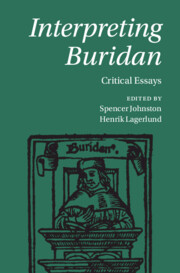Book contents
- Interpreting Buridan
- Interpreting Buridan
- Copyright page
- Dedication
- Contents
- Contributors
- Preface
- Abbreviations
- Introduction
- 1 The Philosopher as Arts Master
- 2 Principles in Buridan’s Logic of Consequences
- 3 Buridan on Paradox
- 4 Modality and Temporality in Buridan’s Logic
- 5 A Paradigm Change within Medieval Philosophy
- 6 Buridan’s Internalism
- 7 John Buridan on the Ontological Status of Artifacts
- 8 John Buridan on Final Causality
- 9 Female Physiology in John Buridan’s Quaestiones de secretis mulierum
- 10 Buridan on the Value of Emotions
- 11 Buridan on Happiness and the Good Life
- References
- Index
Introduction
Published online by Cambridge University Press: 01 February 2024
- Interpreting Buridan
- Interpreting Buridan
- Copyright page
- Dedication
- Contents
- Contributors
- Preface
- Abbreviations
- Introduction
- 1 The Philosopher as Arts Master
- 2 Principles in Buridan’s Logic of Consequences
- 3 Buridan on Paradox
- 4 Modality and Temporality in Buridan’s Logic
- 5 A Paradigm Change within Medieval Philosophy
- 6 Buridan’s Internalism
- 7 John Buridan on the Ontological Status of Artifacts
- 8 John Buridan on Final Causality
- 9 Female Physiology in John Buridan’s Quaestiones de secretis mulierum
- 10 Buridan on the Value of Emotions
- 11 Buridan on Happiness and the Good Life
- References
- Index
Summary
On October 13, 1438 at the University of St. Andrews, what should have been a routine faculty meeting to approve textbooks for the coming year instead (as faculty meetings are sometimes wont to do) became a sharp disagreement over the choice of logic textbook and of correct procedure.1 The disagreement was over whether the views of Albert the Great and Peter of Spain should be allowed to be taught, or only those of John Buridan. In practice, this should have been a routine discussion, as this amounted to little more than a reaffirmation of a previous decision (indeed one with the same wording) adopted in February 1418. The majority of the masters favored teaching Buridan’s views, and, by extension, a nominalist perspective, while a minority of the masters sought to allow the teaching of the logical views of Albert and Peter. One of them, John de Camera, asked that a public record of the majority decision be made (perhaps as a safeguard against future objections from the minority), which in turn led to John Aylmer (or Athilmer) appealing to the university as well as a second official record being taken. Finally, John de Camera asked for a public record of this appeal, claiming that it violated the 1424 assertion of Faculty self-determination.2 This in turn was eventually elevated to chancellor (and founder) of the University of St. Andrews, Bishop Henry Wardlaw, who in turn dispatched the Bishop of Orkney to help settle the issues raised. It was eventually decided that “the doctrines of Albert or of any other philosopher who was orthodox and free from error should for the time being be free.”3
- Type
- Chapter
- Information
- Interpreting BuridanCritical Essays, pp. 1 - 6Publisher: Cambridge University PressPrint publication year: 2024

